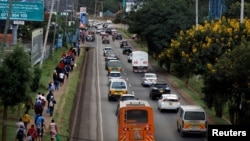Deaths from road accidents in Africa have increased in the past decade, with 250,000 lives lost in 2021 alone, according to the World Health Organization.
The deaths and injuries on African roads are blamed on poor road safety standards, as few African countries enforce laws against speeding and drunken driving, or laws that mandate the use of motorcycle helmets, seat belts and child restraints.
The WHO says road deaths in Africa are becoming a bigger problem compared to other regions of the world. Between 2010 and 2021, road deaths across the continent increased by 20,000. The report released last week conversely shows global road deaths fell by 5% during the same period.
Binta Sako, a WHO technical officer, said the increased deaths are due to a lack of infrastructure and to road users' behavior.
"First of all, we are a growing population. Urbanization without the infrastructure that follows is one of the reasons. The increased number of unregulated vehicles, we are the first importers of used vehicles. Most of the time they are not road worthy,” Sako said. “And then we also have to talk about behavioral risk factors,” such as speeding and drunken driving.
Road users like motorcyclists, cyclists, and pedestrians are most vulnerable and are at high risk of death and injuries. The WHO says the Africa region has the highest proportion of pedestrian deaths.
Researchers say no African country has national laws that meet best road practices.
Sam Clark, the head officer at Transaid, which advocates for road safety, told VOA that training drivers to the required standard helps keep the driver and the other users safe. Transaid, an international NGO, promotes driver training and government and training programs.
"You are improving access to training which meets the standard of many of the transporters in the industry and, therefore, opening the possibility of improved employment or access to new jobs,” Clark said, adding, “but also by giving them better access to training, we are equipping drivers with a better ability to come home safe at the end of every day."
Experts say the under-reporting of road injuries and deaths in Africa is another challenge. Police records are a primary source of data collection, but not all road accidents are reported to police.
Sako said accurate data on road crashes can help develop targeted responses and prevention efforts.
"When we don't have quality data, we don't understand what is going on, we don't understand why people are dying in the roads, what caused those crashes. Is it poor infrastructure, is it poor lighting, is it the use of alcohol?” Sake said. Collecting data helps in understanding “who the victims really are so that we tailor our interventions to make sure that we respond to their needs," she added.
Seventeen countries in Africa have reported reductions in road fatalities, with other countries remaining stagnant or increasing.
The U.N. aims to cut road accident deaths in half by 2030, but road safety workers and activists lack the funding and knowledge to make that goal a reality.
